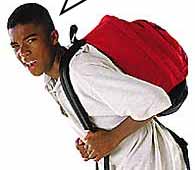

Effects of Backpacks on Students:
Measurement of Cervical and Shoulder PostureThis section is compiled by Frank M. Painter, D.C.
Send all comments or additions to: Frankp@chiro.org




FROM: Aust J Physiother 2001; 47 (2): 110–116
Chansirinukor W, Wilson D, Grimmer K, Dansie B
School of Exercise and Sports Science,
The University of Sydney,
Lidcombe, NSW, 2141, Australia.
chansirinukor@hotmail.com
The aims of this pilot study were to determine whether the weight of a backpack, its position on the spine or time carried affected adolescents cervical and shoulder posture. Standing posture measured from the sagittal and frontal planes of 13 students was recorded photographically under several load carrying conditions. Cervical and shoulder position angles were calculated and compared.
Results revealed that both backpack weight and time carried influenced cervical and shoulder posture. Forward head posture increased when carrying a backpack, especially one with a heavy load. Carrying a backpack weighing 15% of body weight appeared to be too heavy to maintain standing posture for adolescents. These findings have implications for future load carrying studies in adolescents.

Return to BACKPACKS
Since 2-21-2002


| Home Page | Visit Our Sponsors | Become a Sponsor |
Please read our DISCLAIMER |
